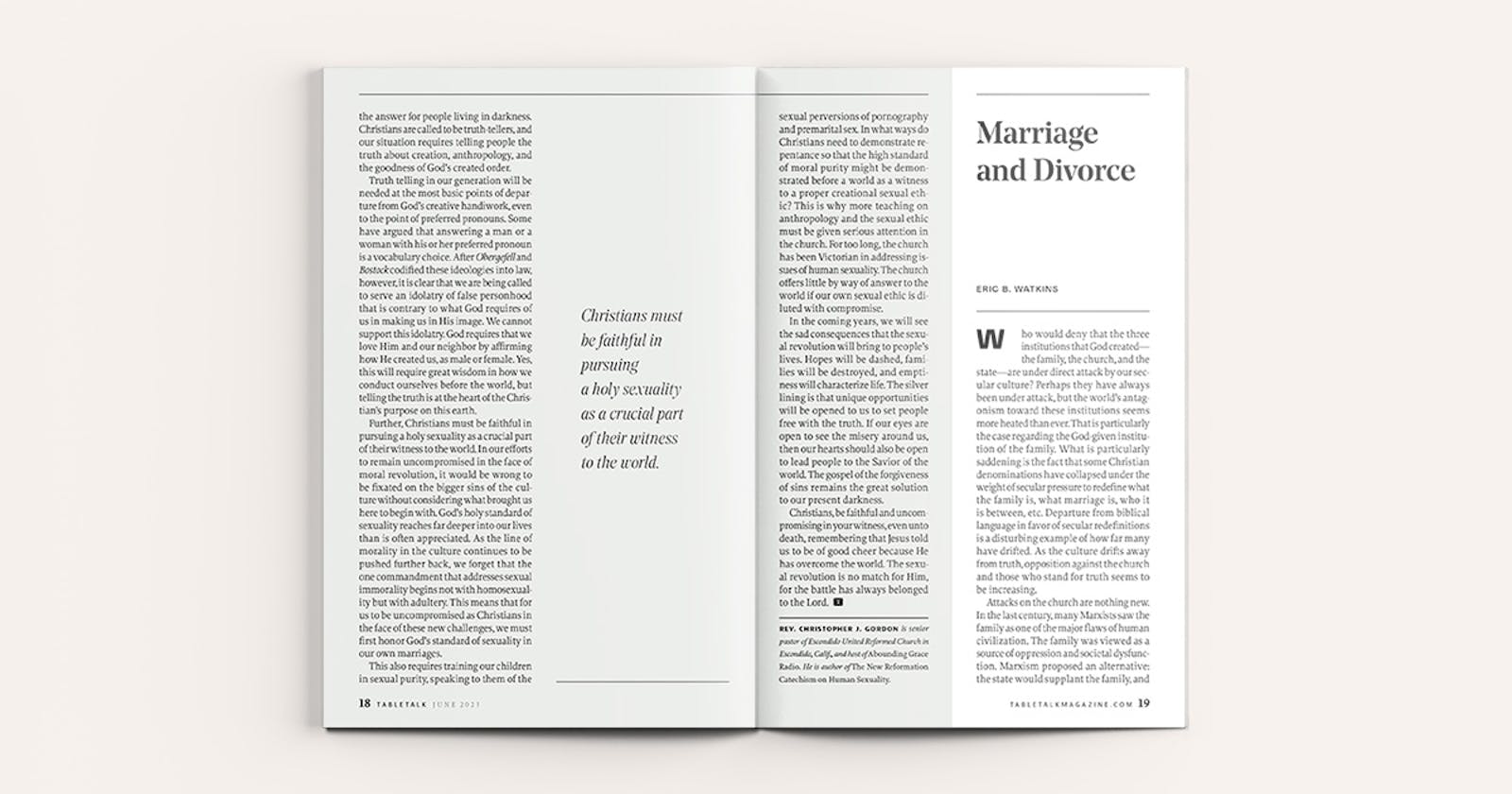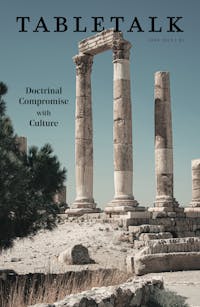
Request your free, three-month trial to Tabletalk magazine. You’ll receive the print issue monthly and gain immediate digital access to decades of archives. This trial is risk-free. No credit card required.
Try Tabletalk NowAlready receive Tabletalk magazine every month?
Verify your email address to gain unlimited access.
Who would deny that the three institutions that God created—the family, the church, and the state—are under direct attack by our secular culture? Perhaps they have always been under attack, but the world’s antagonism toward these institutions seems more heated than ever. That is particularly the case regarding the God-given institution of the family. What is particularly saddening is the fact that some Christian denominations have collapsed under the weight of secular pressure to redefine what the family is, what marriage is, who it is between, etc. Departure from biblical language in favor of secular redefinitions is a disturbing example of how far many have drifted. As the culture drifts away from truth, opposition against the church and those who stand for truth seems to be increasing.
Attacks on the church are nothing new. In the last century, many Marxists saw the family as one of the major flaws of human civilization. The family was viewed as a source of oppression and societal dysfunction. Marxism proposed an alternative: the state would supplant the family, and the government would be in charge of teaching kids, not parents. There were many reasons that Marxism failed to bring about the secular utopia for which it had hoped. Humanity’s attempt to define and rule the world apart from God has always ended badly. Marxism’s ideological child, the organization known as Black Lives Matter, has had a similar disdain for the traditional understanding of the family. BLM’s advocacy of the LGBTQ and related movements has cultivated a context of redefinition in which a biblical view of marriage is now seen as oppressive.
While these external attacks are sobering, they are arguably not the biggest threat to the church and its understanding of the family. J. Gresham Machen argued in the 1930s that the most significant threat to the church was not swords and clubs (the world’s attacking us) but rather the possibility of slowly growing more comfortable and at peace with the world around us. Machen’s concern was that compromise from within would prove to be a serious poison, slowly infiltrating the church and causing it to drift from biblical faithfulness. The idols of comfort and ease are never far from us, and their siren songs always promise much yet deliver little. When the church succumbs to worldly redefinitions of marriage or willingly sacrifices faithfulness on the altar of social acceptance, we are in a dangerous place.
So in what ways is the church potentially tempted to compromise its doctrine and practice related to marriage? The first area of compromise is definition. As illustrated above, Christian denominations that were formerly conservative in their theological views began to make their liberal turns first by embracing a willingness to redefine key categories. In a certain sense, whoever gets to define the terms wins most arguments. How do we define the family, and who gets to make that definition? The Bible defines marriage as a union between one man and one woman. It is God who defines us, our gender, our identity, and marriage—not we ourselves. Christians need to be very careful about playing language games with the world. Once we compromise our definitions, it becomes hard to defend and maintain our faith.
Marriage in our time has also been significantly affected and shaped by a “culture of convenience.” More and more, the divorce rate even in professing Christian circles has risen to levels that are barely rivaled by those outside the church. Divorce in many affluent countries has sadly become normalized. Most children growing up in churches today would find it far more difficult to identify “healthy, normal” families than children growing up two or three decades ago. Many states have made divorce so easy that terminating one’s marriage is not much harder than trading in one’s car. Our sense of commitment is often threatened by our desire for convenience.
Some churches have reacted to this trend by battening down the hatches on marriage in ways that embody an unhealthy extreme. In reaction to churches that seem to allow an “anything goes” approach to marriage (often in the name of “happiness”), the other extreme is to deny any biblical categories of permissible divorce. A “no divorce, no matter what” approach can regrettably enable abusers rather than protect victims. This can leave people in traumatic environments, cut off from what God has given for the protection of His people.

The Westminster Confession of Faith, particularly its chapter on “Marriage and Divorce,” is profoundly helpful, biblical, and protective, not just of the institution of marriage itself but of married people as well. Regarding the subject of divorce, the confession recognizes two grounds: adultery and willful desertion. The first category implies a sexual relationship with someone other than one’s spouse. Such a relationship would give the offended party (victim) grounds for divorce. The latter category (willful desertion) implies that in one fashion or another, a party in the marriage has abandoned the other, such as by literally leaving or by physically abusing one’s spouse. It is very important to note that while both offenses (adultery and desertion) may legitimize a divorce, they do not require one. It is possible that, by God’s grace, even a broken marriage can be saved. As Christians, we should remember that Jesus came into the world not just to be the perfect hero but also to be the perfect husband to His bride—His church. Apart from Jesus, there is no perfect husband. But Jesus loves His church so much that He gave us the institution of marriage. Marriage is a beautiful thing. It is also a beautiful gift from God that we should not squander but should strive to honor with all our being.
Marriage is a God-given, beautiful institution. He made it, He defines it, He delights in it, and so should we. Christians should love what God loves and hate what God hates. We should take marriage so seriously that we strive against all the things that seek to undermine it, things in the world and things in us. We should give our hearts and energy toward building up our marriages and raising up a generation that will glorify and enjoy God in their marriages. Healthy marriages are beautiful, valuable, and precious, not just in God’s sight but also in the sight of His people.
